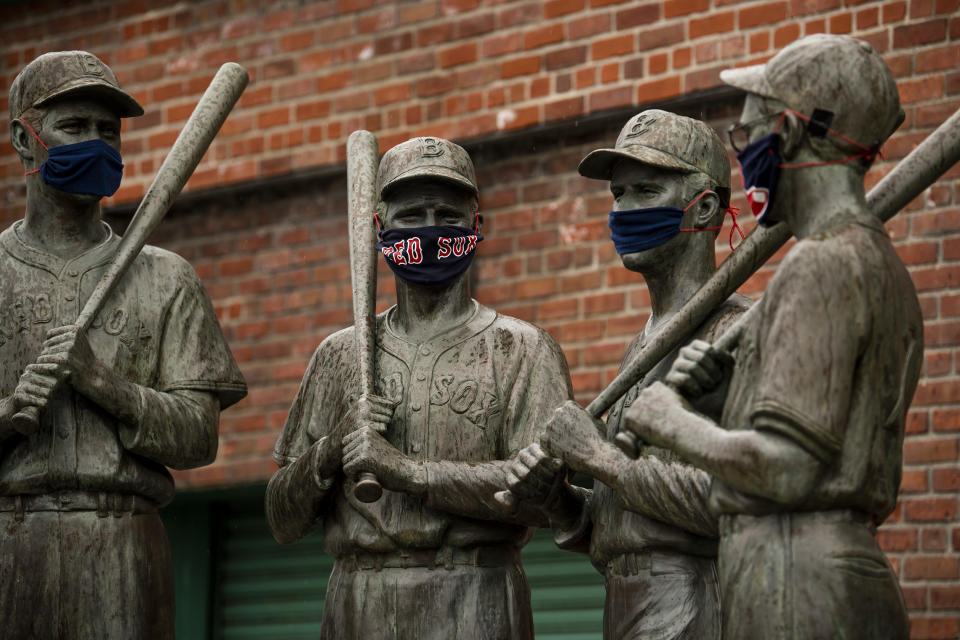Before a potential return to baseball, MLB and players will bicker over money
It’s the middle of May and there hasn’t yet been a baseball game played, which isn’t even the part that’s sad or particularly relevant.
What calls from out there somewhere is the memory of having conducted oneself with dignity when the world was at its worst. The franchise owners, who have cleaned up in a game that all but guarantees them profits. The players, who haven’t done so bad either.
Then the storm came. What mattered was who survived and who helped and who, instead, filled his garage with toilet paper.
There is now enough optimism, unless it is impatience or greed or panic, to begin thinking about baseball in the summer. The schedules and even some of the rules would be different. The ballparks would be empty, at first.
But, there would be baseball on television and something to think about other than what a lonely world it can be. For that, we would be grateful to players and umpires and coaches and staff, to bus drivers and flight attendants and hotel clerks and cabbies, to cameramen and ball boys and the lady who runs the elevator. And to all of their families.
There’d be final scores and standings and, one day, a champion. They wouldn’t be saving lives or delivering food or making masks out of old T-shirts, but it’d be something, something like normal, when normal seems a long way off.
And, maybe, if the experts give the go-ahead and don’t get surprised (again), they’ll get to all that.

First, of course, is the money.
This is how we’ll spend the run-up to baseball in the summer, if there is to be baseball in the summer. Who loses the least. Who wins the most. Who threatens loudest. Who avoids the blame. Who got over on whom. Who believes they have suffered more.
We’ve spent two months watching just about everybody lose something. It’s heartbreaking. This isn’t that, it’ll be important to remember.
On Tuesday, Major League Baseball and the players union will begin negotiations to determine what the game will look and feel like in the short term, a conversation that will involve the owners giving less and the players wanting more than that much less, and everyone will be doing his job, even in the storm.
The coming days, even weeks, will have a lot to say about what the game will look like not just this summer, but in six months, in a year and in five years. They’re going to have to live with each other, the league and its players. And we’re going to have to live with whatever that is.
What should be kept in mind is the economic consequences of baseball this summer will not in any way be a sacrifice. No, that will be waiting for the men and women asked to lean a little further into the pandemic than is perhaps prudent. That’ll include baseball players, no matter how they are tested and retested and distanced. There will be some risk.
Bear with me, but it feels like we've zoomed past the most important aspect of any MLB restart plan: health protections for players, families, staff, stadium workers and the workforce it would require to resume a season. Here are some things I'll be looking for in the proposal...
— Obi-Sean Kenobi Doolittle (@whatwouldDOOdo) May 11, 2020
Team owners will offer as player salaries something like half of the revenues for a season half played. Having run the realm to great personal gain across decades of prosperity, they will ask Tuesday, amidst the crisis, for a partnership. In any case — in a season mostly played or abandoned, in a game with full or empty ballparks — to win together or lose together.
The players, it appears, will resist. They will cite an agreement of six weeks ago they read as the owners having committed to full, if prorated, salaries. Play half a season, get half a salary. When owners do not kick back profits, they agree to wear losses. The league read that agreement differently, in that a baseball summer is not a whole and healthy (or profitable) entity without open ballparks. Further adjustments, coming out of the paychecks of the players, would be required. As a reminder, the league and the union can’t agree on the language, or the intent of the language, six weeks after they signed it.
That’s the argument. Take up your flag. Rage against your preferred injustice. Take your bets on a speedy compromise.
But also be sure there are decent people on both sides of this, some more decent than others, some better at their jobs than others, some blinded by however they define victory. And also be sure that players would be undervalued at twice their pay, and that owners are experiencing some form of economic distress, and that these facts do not necessarily stand in opposition.
All considered, the easy part of baseball in a pandemic passed when they sent everyone home to tend to their families and wait it out. What lies ahead is an uneasy step into an unknown arena, where wins and losses are being counted differently. This is the time to consider how it will look to roll around on the floor over the last of the paper towels.
What calls from out there somewhere is the memory of civility when the world was at its worst. It would be good to start there. Then they could get on with the hard part.
More from Yahoo Sports:

